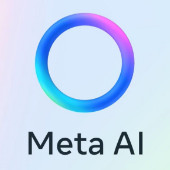

Meta AI
What is Meta AI?
Meta AI is a generative artificial intelligence service that can be used within Meta’s suite of apps, including Facebook, WhatsApp, Messenger and Instagram, or as a standalone web-based app. It is similar to other AI assistants such as ChatGPT, Google Gemini and Microsoft Copilot. However, Meta AI is different because it is part of Meta's existing app ecosystem with millions of users. It was released in April 2024 in English in some countries and is still being rolled out and tested internationally.
Meta AI is built on Llama 3, an open-source large language model, which is still being tested. The Meta AI website includes the warning, ‘Messages are generated by AI and may be inaccurate or inappropriate’.
Meta AI is included automatically in search and messaging features as well as feeds of Facebook, WhatsApp, Messenger and Instagram in some countries, including Australia. It is not included in Meta’s app for children, Messenger Kids. The blue ring-shaped logo is occasionally animated and includes the prompt ‘Ask Meta AI or search’. For example, if you use WhatsApp, the search function is now powered by Meta AI. If you want to search a particular word, phrase or user in your past WhatsApp conversations, this is done through Meta AI. In the same search bar, you can enter prompts to ask questions, generate images or start a conversation with Meta AI.
Meta AI cannot currently be turned off once it appears in Meta’s apps, although chats with Meta AI can be muted. It is difficult to opt out of sharing your data with Meta AI and your posts and interactions on apps that incorporate Meta AI may be used to train its AI models.
Website: meta.ai
Apps: Meta AI is in Meta apps including Facebook, WhatsApp, Messenger and Instagram.
How do people use Meta AI?
Learn more about the benefits and risks associated with how people use generative artificial intelligence services and AI assistants like Meta AI.
Meta AI is used for: encrypted, messaging/online chat, photo/video sharing and screen capture.
How to protect your personal information
These links are provided by Meta:
- Meta AI chat history
See or download your Meta AI chat history and learn more about the type of information Meta collects and how it uses this data. - Change or delete your chat history with Meta AI
How to change or delete your information from chats with Meta AI. - How to disable ‘activity off Meta’
Choose to disconnect specific sites or third parties that share data with Meta, clear previous activity and manage future data sharing.
Key links
These links are provided by Meta:
- Meta AI’s terms of service
The rules that govern your use of Meta AI, including the types of AI generated content that are considered unacceptable, such as harmful or discriminatory material, or material that is sexual in nature. - Meta privacy centre
Meta AI is governed by the privacy policies of Meta’s suite of social media services. This link provides information on how these apps work together and how data is shared among them. - Meta terms and policies
The documents that govern the rights and obligations you have as a user of Meta apps, in which Meta AI is integrated. - Generative AI at Meta
Outlines how content is generated by Meta AI, including how Meta uses your information and the controls you have.
Last updated: 04/08/2025